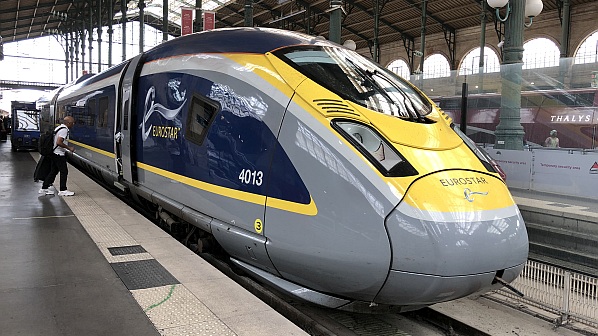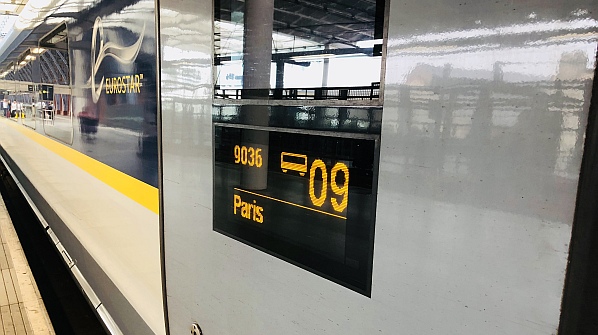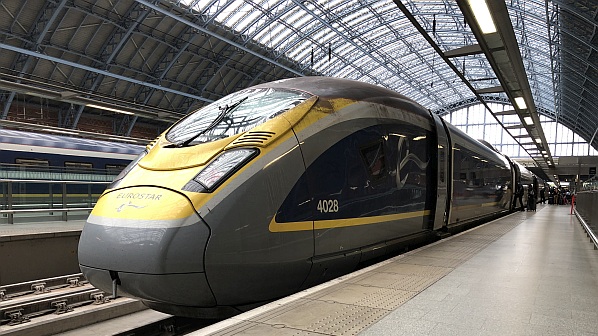FROM September 6 there will be five Eurostar trains running per day between London and Paris. A further three will run on the route from London to Brussels; one of those extended to Amsterdam.
More than once it looked like increases in services may not happen, or that Eurostar would cease to exist! As recently as May, the cross-Channel operator was claiming its services from London to Paris, Brussels and Amsterdam had experienced a more severe drop in demand than any other European train operator or competitor airline.
Its management had been forced to watch as its future, and the employment of around 3000 staff, became a political football. Rival airlines received support from a British government adamant that it had the green agenda at the centre of its plans. Yet senior British politicians would be quoted as saying that a company registered in London was not their business to save due to the lack of British ownership.
In March 2020, as Covid-19 tightened its grip on the world, and the threat of travel restrictions loomed large, Eurostar’s then CEO Mr Mike Cooper said that the situation was changing by the hour and that everyone, be it staff or customers, were facing unprecedented challenges. “We’re working hard to maintain an essential service, keeping in mind that so many individuals, families and businesses are relying on us,” he said.
Within days Europe had locked down; Britain had banned its residents from leaving their homes unless for work, exercise or buying essential supplies. Working from home was the new normal and international travel suddenly became a luxury for the few who still needed to conduct business; even then only people with certain jobs were allowed to travel.
Of course, this had a hugely negative impact on Eurostar. Instantly all its routes reduced in frequency. One train a day ran between London and Paris: the same on the route to Brussels from London. All other destinations had their services cancelled, and this remains the case 18 months later. Until the pandemic, Eurostar served three stations in Britain: London St Pancras International, Ebbsfleet International and Ashford International. But it has since made the decision to stop serving the latter pair until 2022. Its train from London - Marseille has also been suspended until next year. There has been no confirmed date for the reopening of the British stations or the restart of the serviced to the south of France, the Alps or Disneyland Paris.
And yet it had been a promising first three months in 2020 for the cross-Channel operator. The planned merger with Thalys was to have been ratified in April 2020, something Cooper confirmed on a press trip to Paris on November 14 2019 to mark Eurostar’s 25th anniversary.

On March 5 2020 a ceremony saw St Pancras International and Bordeaux St Jean stations formally twinned, with French National Railways (SNCF) targeting the introduction of direct trains between the two cities by 2022.
The month before had seen the first direct London Eurostar train depart Amsterdam ahead of the planned start of commercial services on April 30 2020.
Then the pandemic struck. At the peak of the crisis, Eurostar was carrying 1% of its average pre-pandemic passenger loadings. By early-July 2020, as the world was trying to recover from the first wave of the pandemic, the operator was assessing all its options.
The British government had not provided financial help beyond allowing it to use the furlough scheme. It had supported the domestic rail network through the Emergency Measures Agreement (EMA) scheme, but Eurostar was unable to access this. Two-thirds of its 1800 workforce are based in Britain, while a further 1000 staff relied upon the operator through its supply chain.
“The impact of Covid-19 has led to an unprecedented fall in demand across the travel industry,” IRJ quotes Eurostar as saying on July 10 2020. “We are taking steps to protect Eurostar for the long-term by reducing costs across the business and are taking a considered approach to reducing our payroll costs, working closely with trade union partners.
“We are looking to introduce reduced hours and part-time working wherever possible throughout 2021 to protect as many jobs as possible and retain the knowledge, skills and experience of our people for the recovery, keeping any potential redundancy to a minimum.” One trade union suggested this amounted to a 20% cut in costs.
The minimal service levels continued through the summer. Travel between Britain and mainland Europe was not encouraged prior to the start of the Covid-19 vaccination, but the debate over which organisations should be picking up the bill for Eurostar’s financial collapse had begun.
It was at this point the operator’s ownership came into sharp focus. As of 2015 there was no British owning stake after the government sold its 40% stake in the business to Caisse de dépôt et placement du Québec (CDPQ) and Hermes Infrastructure for £757m. The largest stakeholder remained SNCF (55%) while Belgian National Railways (SNCB) retained a 5% share.
Eurostar itself, various British unions, and later various business leaders all called on the British government to support the ailing operator. Until the pandemic, business had been improving. In 2019 Eurostar carried 11.1 million passengers, up from 11 million in 2018 although its revenue dropped from £989m in 2018 to £987m in 2019 as a result of industrial action in France. Eurostar had managed to recover from the drop in American passengers following terrorist attacks in Paris, Nice and Brussels in 2016 and 2017. Now it faced a new challenge.

By the end of November 2020, Eurostar’s future was uncertain. In an article in The Independent newspaper in Britain, its new CEO, Mr Jacques Damas, and CEO of HS1, Ms Dyan Crowther, urged the government to intervene, highlighting that jobs were at risk under the circumstances and that should the business fail then that would threaten connectivity and reverse plans regarding decarbonisation.
The article was against the backdrop of rates relief for airports, which the operator said put it at a direct disadvantage. These reliefs were introduced by a Conservative government that claims to have the green agenda at the forefront of its plans for Britain. Yet it seemed to be happy to let Eurostar fail.
By comparison, the French government, as part of the Covid-19 relief plans, had informed Air France that the deal for €4bn of financial aid included the caveat that short-haul flight routes competing with high-speed rail routes of 2h 30min or less would be cancelled.
While discussions have been held between the British government and Eurostar, the Department for Transport told IRJ in late-November 2020 that the financial difficulties the operator faced were recognised and that the Global Travel Taskforce set up by the British government would work closely with Eurostar as it supported the safe return to international travel. RMT general secretary, Mr Mick Cash, reacted by stating “it is wholly wrong that Eurostar, an eco-friendly service that is a beacon for the future of our railways, is being denied the kind of financial support being offered to the airports.”
Then, on February 3, British Secretary of State for Transport, Mr Grant Shapps, confirmed that help was unlikely. He told the House of Commons Transport Select Committee that Eurostar was “not our company to rescue” and, in the same meeting, admitted that had the British government not sold its stake then it may have intervened. It was a Conservative party-led coalition that sold the stake. Now the Conservative party was all but washing its hands of Eurostar and therefore employees and the supply chain, of which almost 2000 were British taxpayers.
Yet discussions between Shapps and his French counterpart, Mr Jean-Baptiste Djebbari, had been held prior to the admission by Shapps, but it was stated that the British government believed the onus was on the French government and Shapps said he wanted to see a rescue plan from SNCF. Djebbari had stated a fortnight before his British equivalent’s bombshell that it was his intention that the French government would provide financial assistance.
At the same time, in early February, it was confirmed Eurostar’s debt was £335.6m in 2019 and was thought to have doubled after medium-term debt facilities of €155m and €210m were agreed in 2019 and 2020 with its train fleet pledged as security.

One year, almost to the day, after British prime minister, Mr Boris Johnson, announced the full-scale lockdown that would effectively destroy Eurostar’s business, the operator confirmed it was in advanced discussions ahead of a possible financial catastrophe.
On March 22 SNCF CEO, Mr Jean-Pierre Farandou, told the Financial Times that these discussions were needed to keep the operator afloat. Eurostar had wanted a £60m loan through the UK Export Finance (UKEF) facility, which had been created to support businesses post-Brexit. Airlines EasyJet and British Airways had received UKEF backing for loans worth more than £3bn between December 2020 and March 2021.
“I’m fed up with both governments,” Damas told the FT. Back in mid-January SNCF Voyageurs CEO and chairman, Mr Christophe Fanichet, said in an interview with a French newspaper that in Britain Eurostar was viewed as a French business, while in France it was viewed as a British business. It was pointed out that Eurostar remains registered in London.
Finally, in mid-May, there was a breakthrough. A £250m refinancing agreement was reached. The financing comprised £50m shareholder equity, £150m shareholder guaranteed loans and £50m from restricting existing loan facilities provided by lenders. The loans were backed by SNCF, SNCB and CDPQ and Hermes Infrastructure. Damas called this development encouraging while claiming the company would continue working with governments regarding the easing of travel restrictions.
On May 27 the number of trains running on the London - Paris route doubled from one to two. A small start, but a positive step, nonetheless.
The financial impact of the pandemic on Eurostar was laid bare in the SNCF half-year results published at the end of July. It reported that revenues from long-distance operations, including TGV InOui, Thalys and Eurostar were down by 57% at €1.9bn compared with €4.5bn in the first half of 2019.
At the same time, an interview with The Daily Telegraph saw Damas reveal that Eurostar’s debt was almost £1bn at the start of August. He urged Johnson to introduce an air tax system that would help the operator. “If you do not want to ban, but give an incentive, it is very easy,” he said. “If you just work with the taxation system. If you take just £1. Take £1 more in taxing fuel for aircraft and take that £1 as a reduction in access charges on the railway.”
Damas also confirmed that Eurostar had reached the point where it could be confirmed the business would not collapse.
When announcing the service increase, Eurostar confirmed that since the easing of travel restrictions by the British government during August, there had been a 105% rise in weekend trips in August and September compared with last year, with 83% of these bookings attributed to leisure travel. The operator has retained its flexible ticketing rules that allow passengers to exchange their tickets up to seven days before travel for free.
Eurostar has made it through the pandemic, but only just, and has a long road ahead to rebuild the business. IRJ.

